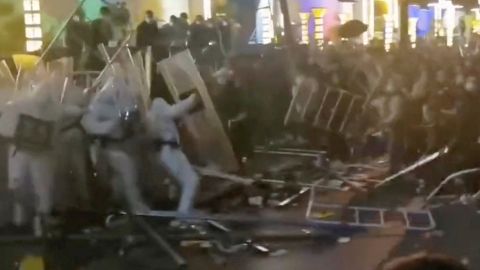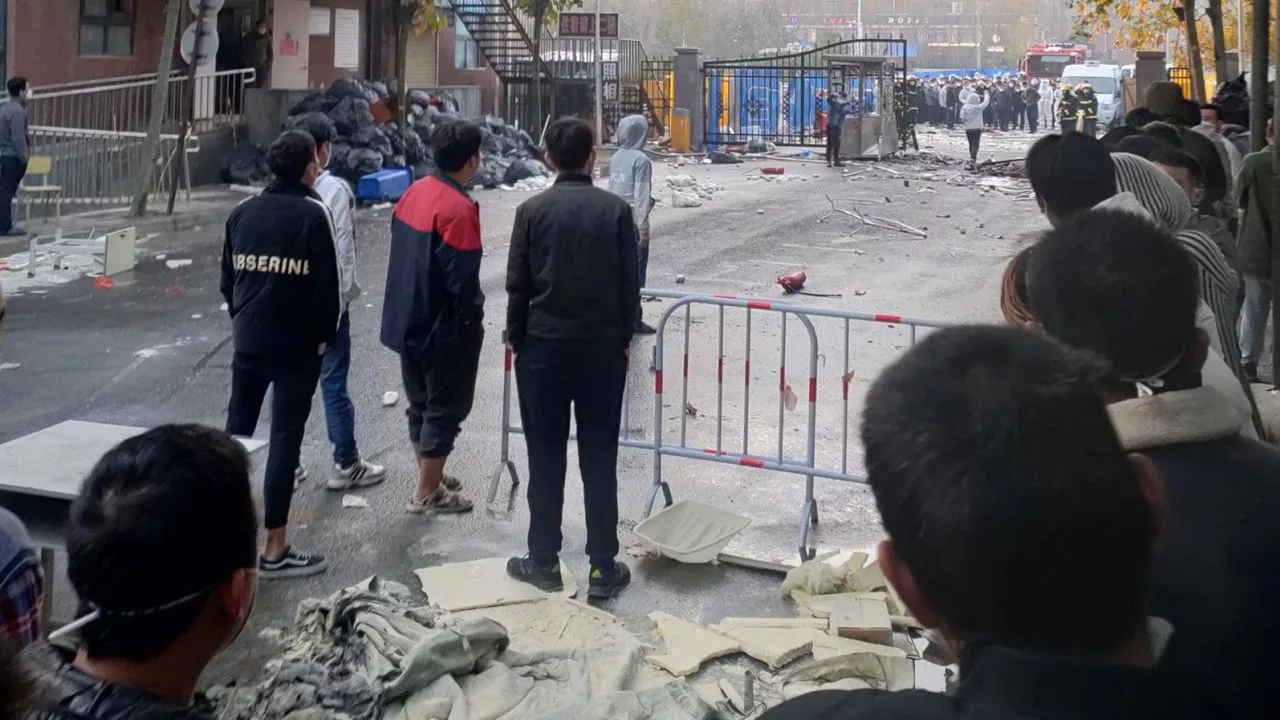Hong Kong- A violent workers’ revolt at the world’s largest iPhone factory this week in central China is further scrambling Apple’s strained supply and highlighting how the country’s stringent zero-Covid policy is hurting global technology firms.
The troubles started last month when workers left the factory campus in Zhengzhou, the capital of the central province of Henan, due to Covid fears. Short on staff, bonuses were offered to workers to return.
But protests broke out this week when the newly hired staff said management had reneged on their promises. The workers, who clashed with security officers wearing hazmat suits, were eventually offered cash to quit and leave.
Analysts said the woes facing Taiwan contract manufacturing firm Foxconn, a top Apple supplier which owns the facility, will also speed up the pace of diversification away from China to countries like India.
Daniel Ives, managing director of equity research at Wedbush Securities, told CNN Business that the ongoing production shutdown in Foxconn’s sprawling campus in the central Chinese city of Zhengzhou was an “albatross” for Apple.
“Every week of this shutdown and unrest we estimate is costing Apple roughly $1 billion a week in lost iPhone sales. Now roughly 5% of iPhone 14 sales are likely off the table due to these brutal shutdowns in China,” he said.

Security forces clash with workers during a protest outside Apple supplier Foxconn’s factory in Zhengzhou, China, on November 23.Reuters
Demand for iPhone 14 units during the Black Friday holiday weekend was much higher than supply and could cause major shortages leading into Christmas, Ives said, adding that the disruptions at Foxconn, which started in October, have been a major “gut punch” to Apple this quarter.
In a note Friday, Ives said Black Friday store checks show major iPhone shortages across the board.
“Based on our analysis, we believe iPhone 14 Pro shortages have gotten much worse over the last week with very low inventories,” he wrote. “We believe many Apple Stores now have iPhone 14 Pro shortages … of up to 25%-30% below normal heading into a typical December.”
Ming-Chi Kuo, an analyst at TF International Securities, wrote on Twitter that more than 10% of global iPhone production capacity was affected by the situation at the Zhengzhou campus.
Covid outbreak
Earlier this month, Apple said shipments of its latest lineup of iPhones would be “temporarily impacted” by Covid restrictions in China. It said its assembly facility in Zhengzhou, which normally houses some 200,000 workers, was “currently operating at significantly reduced capacity,” due to Covid curbs.
The Zhengzhou campus has been grappling with a Covid outbreak since mid-October that caused panic among its workers. Videos of people leaving Zhengzhou on foot went viral on Chinese social media in early November, forcing Foxconn to step up measures to get its staff back.
To entice workers, the company said it had quadrupled daily bonuses for workers at the plant this month. A week ago, state media reported that 100,000 people had been successfully recruited to fill the vacant positions.
But on Tuesday night, hundreds of workers, mostly new hires, began to protest against the terms of the payment packages offered to them and also about their living conditions. Scenes turned increasingly violent into the next day as workers clashed with a large number of security forces.
By Wednesday evening, the crowds had quieted, with protesters returning to their dormitories on the Foxconn campus after the company offered to pay the newly recruited workers 10,000 yuan ($1,400), or roughly two months of wages, to quit and leave the site altogether.
Opportunity for India
In a statement sent to CNN Business on Thursday after the protests had wound down, Apple said it had a team on the ground at the Zhengzhou facility working closely with Foxconn to ensure employees’ concerns were addressed.
Even before this week’s demonstrations, Apple had started making the iPhone 14 in India, as it sought to diversify its supply chain away from China.
The announcement in late September marked a major change in its strategy and came at a time when US tech companies were looking for alternatives to China, the world’s factory for decades.
The Wall Street Journal reported earlier this year that the company was looking to boost production in countries such as Vietnam and India, citing China’s strict Covid policy as one of the reasons.
Kuo said on Twitter that he believed Foxconn would speed up the expansion of iPhone production capacity in India as a result of Zhengzhou lockdowns and resulting protests.
The production of iPhones by Foxconn in India will grow by at least 150% in 2023 compared to 2022, he predicted, and the longer term goal would be to ship between 40% and 45% of such phones from India, compared to less than 4% now.
— Chris Isidore contributed to this report.





